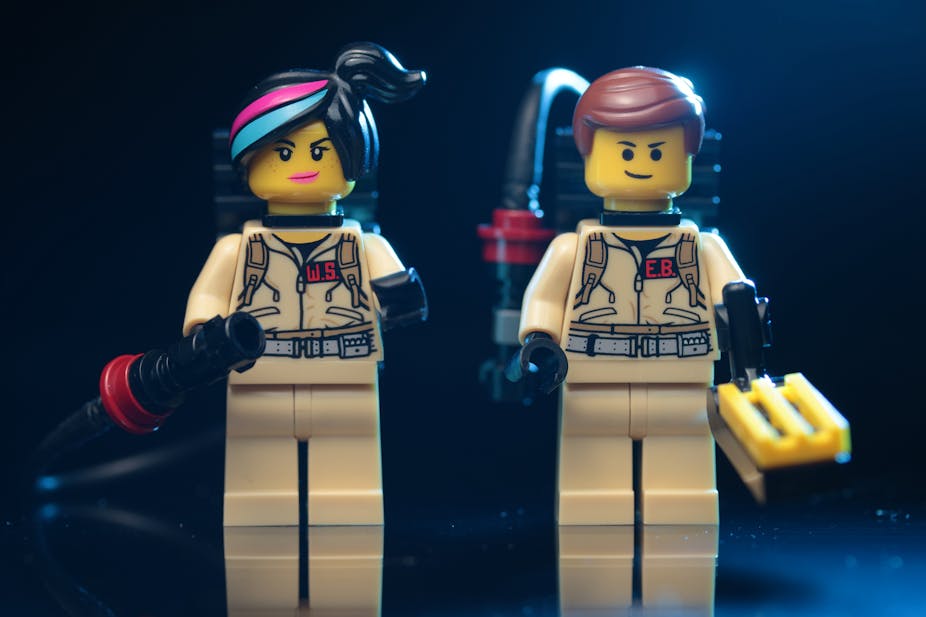Last week, director Paul Feig announced that the protagonists of Ghostbusters 3 would all be women. While some have heralded the female follow up as a feminist coup, others – including many fans – have complained that feminising the 80s classic is at best a gimmick and at worst close to sacrilege.
Slated for release in July next year, the film will star actors Kristen Wiig, Leslie Jones, Kate McKinnon, Melissa McCarthy.
Like most blogosphere battles, the Ghostbusters debate also indicates broader cultural concerns, in this case particularly around what “feminism” and “feminist media” means in the contemporary West.
Various feminist journalists and bloggers have entered into the debate – slamming “dude fans” and championing the potential of a woman-centred reboot. Others have expressed concern as to whether women in the remake are simply enhancing a sales pitch; or that Ghostbusters Mark 3 is further evidence that Hollywood is only capable of femme-friendly films in the rehash form – not in original content.
The web chatter about the forthcoming film points to a type of insidious sexism which nostalgises a fantasy past in which gender roles appeared (apparently) more distinct. That was a time in which the humour of a movie like Ghostbusters was straightforward – and apparently hinged on the sexist turns of Bill Murray’s lead character.
One of the main criticisms from the Twitterati of Feig’s casting choices is that he is “messing with a classic”. The website Sheknows collated some of the best “manbaby tweets” about the Ghostbusters remake. Here are a few representative samples:
You are idiots Sony. This @paulfeig feminist movie a horrible idea. You will tarnish #Ghostbusters. We fans will not see it - @war_hog419
Now they want to ruin ghostbusters with women … leave Gb alone fuks - @Mikeleaf17

A similar masculinist nostalgia has also been expressed by film journalists. Mike Fleming laments on donotlink.com:
Signing Feig would be great news for Kristen Wiig and Melissa McCarthy … but what about the rest of us? The ones who feel a level of ownership of the classic 1984 guy comedy Ghostbusters? … I feel slimed.
Who are “the rest of us”? Men, it seems – a strange turn of denial that we live in a patriarchy.
For many Generation X-ers (and even Ys) like Fleming, Ghostbusters – like Star Wars and Indiana Jones – works as more than simply a film. It represents childhood. Nostalgised childhood obviously holds a lot of affective pull – so when this nostalgia intertwines with a sexist imagining of the past the discourse around such “trivial” matters as film castings takes on a different cadence.
As countless academics, including Frederic Jameson and Simon Reynolds have pointed out, nostalgia is not for a “real” past. Nor is this really “the point”. Rather it operates as a means to shore up (often reactionary) politics in the present.
This is visible in rhetorics that celebrate white Australia through a wilful absenting of our violent past and present history of race relations in discussions of “happier times” when migrants knew their place as food providers, factory workers and shopkeepers. The work of sociologist Ghassan Hage is particularly acute on this topic.
Web pundits outraged by the Ghostbusters reboot frame the original film as not only a sacred site representative of childhood but also as sacred due particularly to the its male protagonists. Implicit here is that the action genre is a male domain. Implicit, too, is the anxiety that somehow this is no longer the case.
As Reynolds’ work on “retromania” makes clear, nostalgia turns on the articulation of a loss in the present of a better past. (Reynolds also, incidentally, while discussing music, notes the masculinised mode of such mania, think of LP collectors and their sports-fan like knowledge of back catalogues).
From the tenor of blog discussions it would seem the success of franchises such as The Hunger Games and the inclusion of female leads in Guardians of the Galaxy has shattered the collective fan-boy male ego (Jezebel spoofs this in its Hysterical Man blog about Ghostbusters).
The tone of crisis, of course, is the bread and butter of social media (see previous “outrages” over Miley, Lena Dunham, Iggy Azalea and so on) But here, we see the broader simmering rhetoric of a “crisis of masculinity” played out around a seemingly innocuous piece of pop culture.
Masculinity is not “in crisis” – in Hollywood, in the comic-verse, or anywhere else. Women remain oppressed economically; sluts are shamed socially, and are still pieces of eye-candy in action genre movies – whether they are toting a bow and arrow or a proton pack.
Nonetheless, flashpoints like the Ghostbusters reboot harness potent sites of nostalgia to drive home and maintain a sense of crisis – and this undermines feminist struggles against patriarchy in the present. So we see in the noise around Ghostbusters an affront that a nostalgic object is reworked and “gender-bent” intertwined with an appeal to my generation’s fondness for a childhood film.
Who would dare mess with Ghostbusters? Only a killjoy. Or a feminist killjoy.

